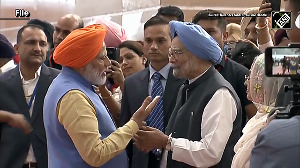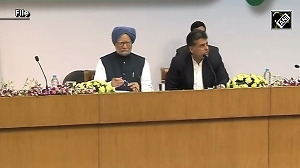A spectre now haunts the western world: the spectre of that word which isn't even a word in the dictionary: offshoring.
In session after session at the World Economic Forum's annual meeting here, concern, fear and desperation came through about the loss of jobs, mostly but not only to India.
And the fears were not quelled when Swati Piramal of Nicholas Piramal told a session on Friday evening: "You ain't seen nothing yet."
In terms of plain numbers, as one speaker pointed out, it is not a huge problem as yet because fewer than 400,000 jobs have been "offshored" so far, and the size of the US workforce is 135 million, so it is a 0.4 per cent problem.
But others point to the forecast that 3 million jobs will go overseas in the foreseeable future, that this is a huge percentage when measured against the total numbers unemployed, and that many of those jobs will be high-paying white-collar jobs of radiologists, equity analysts, lawyers and tech researchers, strong middle-class groups that are both politically influential as well as vocal.
Remarkably, for all that (and this was before the Senate resolution on the subject became known), the preferred policy response is not protectionism.
The French minister for economy, finance and economy (who confessed to spending sleepless nights on the issue) and the British secretary of state for industry both argued that protectionism would solve nothing, that one should also bear in mind the spin-off benefits of increased incomes in countries like India, and that the offshoring trend was a direct result of consumer preferences in the rich countries, and the consumers were free to choose.
The representatives here of the British Trades Union Congress and of an independent Geneva-based union that seeks global reach, argued against protectionism too, but they sounded like rabbits caught in the glare of sudden headlights, not knowing which way to move.
As the Swiss trade unionist argued, "I don't want to argue against Indian workers, because we want to represent them too. And we want global work contracts with companies, representing workers in all countries."
But the preferred solution -- worker re-training -- was dismissed by many panelists as something that simply was not an adequate response.
Chief executives came in for some roasting, for not being upfront about the offshoring position and for not being sensitive to the human issues involved.
But the end point in most discussions was a cul-de-sac: the process may be inevitable and globalisation may be good, but you can't lie back and enjoy its negative effects.
McKinsey, the consulting firm, organised a private breakfast to discuss its upbeat finding, that the process is actually win-win because the US benefited more from offshoring than it lost, but most of those present at the breakfast argued that while this might be true in an absolute sense, there was the problem of transition and how to reduce the cost and suffering of getting from here to there.
This central challenge and the absence of easy answers raised the possibility of a political backlash, especially in election years -- and some economists and business school professors at Davos seemed more hawkish on the issue than the politicians and trade unionists.
Nandan Nilekani of Infosys rubbed in the ironies at a workshop on outsourcing by saying that Indian companies in the forefront of winning offshoring contracts were merely using the technologies, business practices and economic policies that had been both pioneered and advocated for years by the West.
"You asked us to liberalise our economies, you preached the virtues of globalisation, you invented the business practice of outsourcing. We have merely followed your advice and used the tools that you gave us."
CK Prahalad, the professor of business administration at Michigan, put it more tactfully when he declared to worried panelists at one session: "The western agenda is working. We advocated globalisation and this is how it works."
Prahalad suggested that discussion on the issue should not be like the six blind men of Hindustan trying to work out the contours and identity of an elephant.
"There are four sets of constituencies involved: the workers who are displaced, the consumers who benefit from cheaper products and services, the governments in the economies where jobs are lost, and the poor economies where jobs are gained. We should keep all four in mind, because you can't say you want a DVD player for $49 and then say you don't want it produced in China."
The head of an HR firm put the issue in a different perspective when he argued that the issue for a company that employs 50,000 and decides to offshore 10,000 of them, is not how to save those 10,000 jobs but to make sure that the other 40,000 jobs were not lost--which is what would happen if the company did not stay competitive and went under.
As much was argued by Sanjay Kumar of Computer Associates, who said the pressures on chief executives to stay competitive were enormous and they had to be constantly alert to cutting costs, especially if competitors were doing it.
But when he tried to argue that outsourcing was as old as the hills and not a new phenomenon, others jumped on him and argued that the Internet and modern communications had suddenly made many non-tradeable (read 'safe') jobs and activities into tradeables, and the dramatic speed of the change was part of the problem.
The chief executive of a tech advisory firm suggested in one session that the boot might soon be on the other foot, because many of the jobs being outsourced to India today would themselves become redundant in two or three years, as new technologies were developed.
At the end of the day, however, the lasting impression was of Swati Piramal speaking softly and telling her audience in blunt terms: "It costs you in Europe a billion dollars to develop a new drug, but we in India can do it for $50 million. This means much cheaper medicines and better health care for billions of people around the globe."
What is equally clear is that a lot of people in the western world are going to need pills for headaches and sleepless nights and anxiety disorders -- and that might mean trouble for countries like India too.






 © 2024 Rediff.com -
© 2024 Rediff.com -